Nylon rope is a strong and versatile rope made from a synthetic polymer called polyamide. It’s very popular for its durability, elasticity, and excellent ability to absorb shock loads. The nylon rope also has excellent resistance to abrasion, UV, acid, oil, and most chemicals. Plus, it lasts longer than a natural fiber rope.
Keep reading if you’re wondering what makes nylon rope better than most ropes! This article will tell you all about the history, types, and advantages of nylon ropes. You’ll also find out where you can buy nylon rope in bulk or wholesale, so stay tuned because there are more surprises for you.

Source: Pixabay
History of the Nylon Rope
Nylon was the first synthetic fiber rope introduced during World War II. It was discovered in the late 1930’s used for military applications. They use nylon and transform them into braided ropes to use as a parachute cord as well as climbing and tow ropes for the gliders.
The types of nylon used to make ropes are Nylon 6 and Nylon 6.6. Wallace Carouthers discovered Nylon 6.6 in 1935. Meanwhile, Paul Shlack was the first to discover Nylon 6 in 1938.
After the war, nylon became more popular because of its strength and versatility are now used in many applications.
Nylon ropes, and other synthetic fiber ropes, became a better alternative to natural fiber ropes like hemp or cotton rope. The nylon rope also replaced the wire rope for most mooring applications. And today, nylon is one of the best high-quality ropes that offers excellent performance for all roping needs.
Types of Nylon Ropes
Nylon rope also has different types of construction, each having its own unique characteristics and properties. Some types of constructions give a better advantage in some applications, so you have to determine which type will suit your need the best.
Solid braid
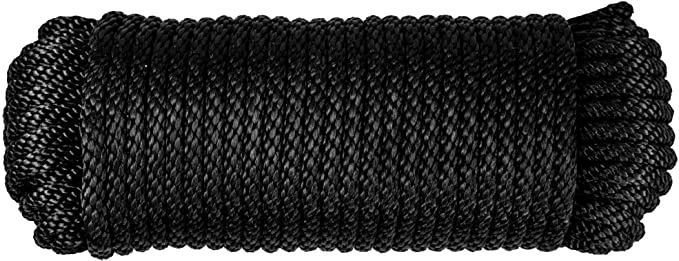
Source: Amazon
A solid braid is a type of rope construction where the nylon fibers are braided tightly together to form a solid, smooth, and compact rope. Because of the tightness and compact structure of the rope it tends to be more rigid, but much stronger and resistant to abrasion.
Also, do not confuse it with a single-braid rope because they are two different rope constructions, with single-braided ropes being more flexible.
Twisted

Source: Amazon
Twisted ropes look the way it sounds. Individual nylon fibers are twisted together to form a cord-like structure allowing for better flexibility. If you have a project that needs very bendy ropes, twisted ropes are the way to go!
Braided
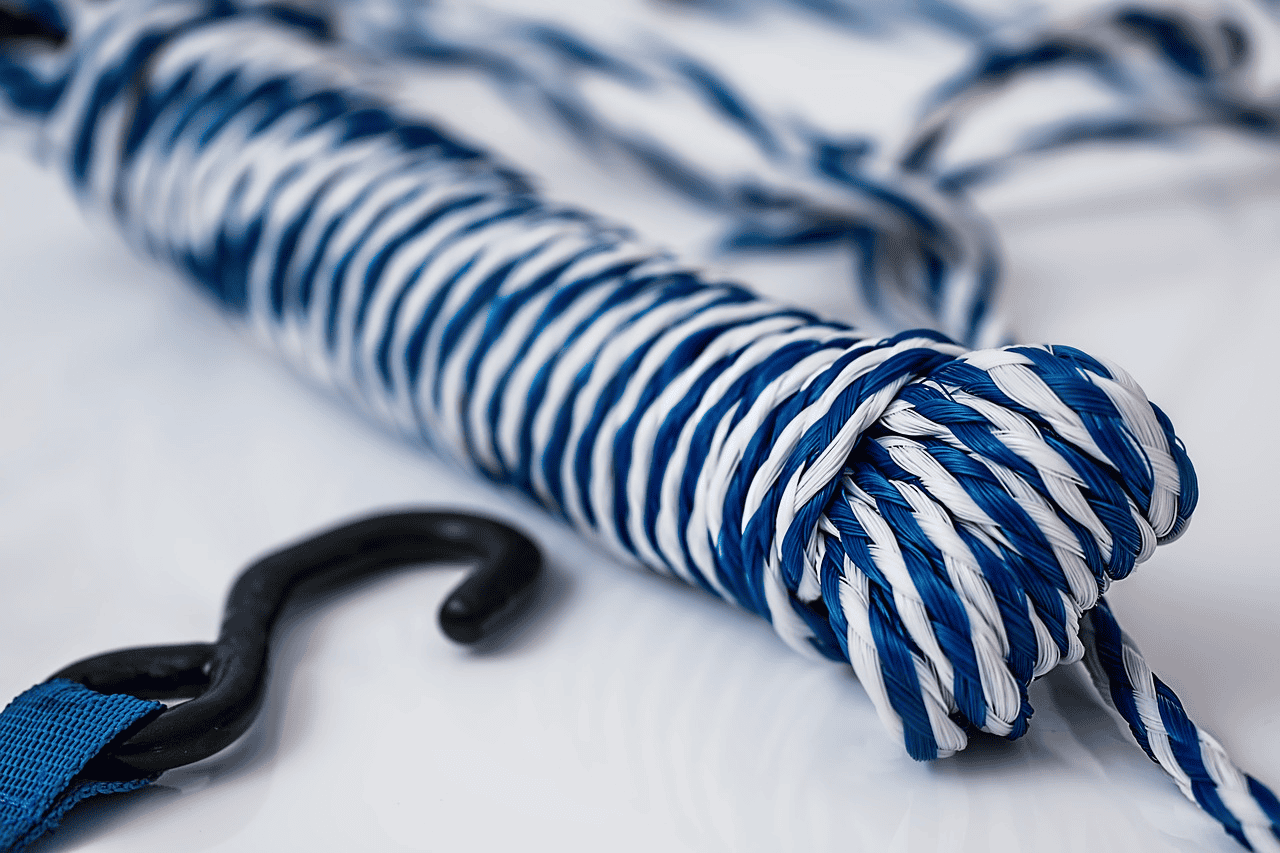
Source: Pixabay
Braided nylon ropes are made by braiding individual nylon fibers together to transform it into a rope-like structure. This type of construction is known for its strength, durability, and grip, which is the best option for demanding applications.
Double braided rope
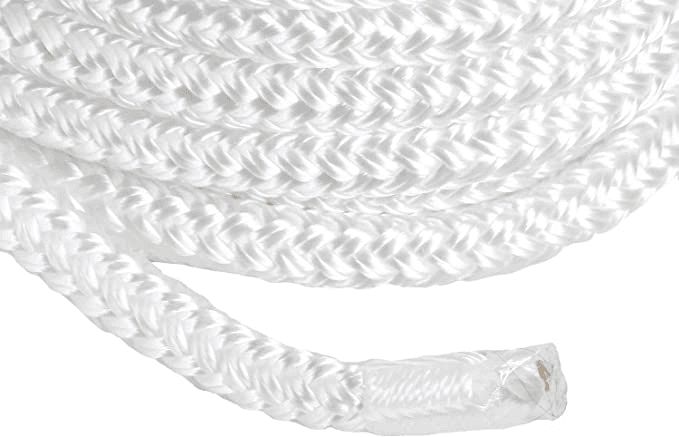
Source: Amazon
Double-braid rope is also a type of braided rope that uses two layers of nylon fibers that are braided together to create a strong, double-layered rope. These are the type of ropes that are excellent to use for various applications because of their strength and versatility. Some of its applications include rescue operations, marine use, industrial, and more.
Three-Strand Twisted
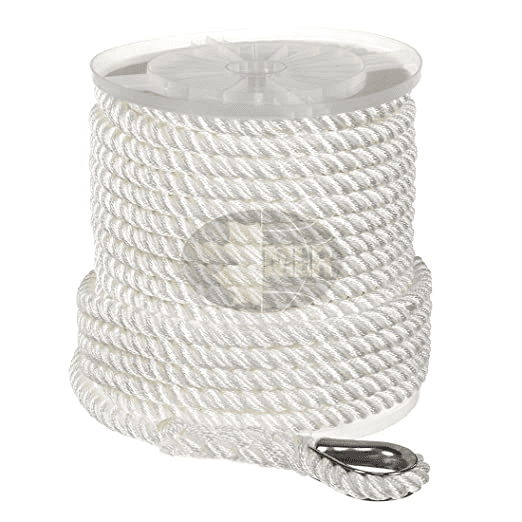
Source: Amazon
Another type of rope know for its strength and flexibility is the three-strand twisted rope. It’s made by twisting three separate strands of nylon fiber together to form a continuous cord-like structure. This one’s ideal for applications that needs a balance of both strength and flexibility.
Advantages of Nylon Rope
There’s a reason why nylon is so popular among industries. It offers many great advantages, making it the perfect rope for most applications. Some of the benefits of nylon rope are:
- Excellent strength
- Stronger than most fibers like polypropylene and polyethylene
- Abrasion-resistance
- UV resistance
- Elastic and good shock absorber
- Resistant to rot, mildew, and mold
- Great flexibility
See how the nylon rope performs in comparison to other ropes.
Nylon rope vs. polyester rope
Nylon rope has a greater shock-absorbance advantage. It can stretch up to 20 – 30% and return to its original size without affecting its strength. This makes the nylon rope ideal for shock-absorbent applications such as towing or mooring lines.
But compared to polyester rope, nylon rope is very water absorbent. Water compromises the strength of the nylon rope and deteriorates when exposed to fresh or saltwater. Meanwhile, polyester rope maintains strength when wet and doesn’t shrink in size.
Interested to learn more about polyester rope? Check out our article about polyester rope, its history, applications, advantages, and disadvantages.
Nylon rope vs. polypropylene rope
Of the two, nylon rope immediately wins in strength, durability, and elasticity. Polypropylene rope also has redeeming qualities. It floats great on the water, which is ideal for water sports and recreation. It’s also resistant to moisture and rots and less expensive than nylon rope!
Want to see a direct comparison of nylon, polyester, and polypropylene rope? Check out this informative YouTube video about each rope’s advantages and how to choose the right rope for your roping needs.
Nylon rope vs. kevlar rope
The kevlar rope differs in many ways from the nylon rope. Kevlar has low stretch, extreme temperature resistance, remarkable strength, and cut resistance. It’s suitable for applications that need great stability and environments with extreme temperatures.
But, as great as it sounds, it also has a weakness: UV rays. Constant and prolonged exposure to UV rays can weaken it, unlike a nylon rope that’s more UV resistant.
Applications of Nylon Rope
With nylon’s many great properties, you might be wondering what kind of applications can you use it for to maximize its strength, durability, and elasticity. Here are some of the common applications of the nylon rope:
Mooring and anchor line

Source: Pexels
Nylon is also great to use as a marine rope, maybe not directly in water but it has great use as anchor and mooring lines. It’s strong and flexible enough to secure boats, ships, and other vessels.
Towing rope
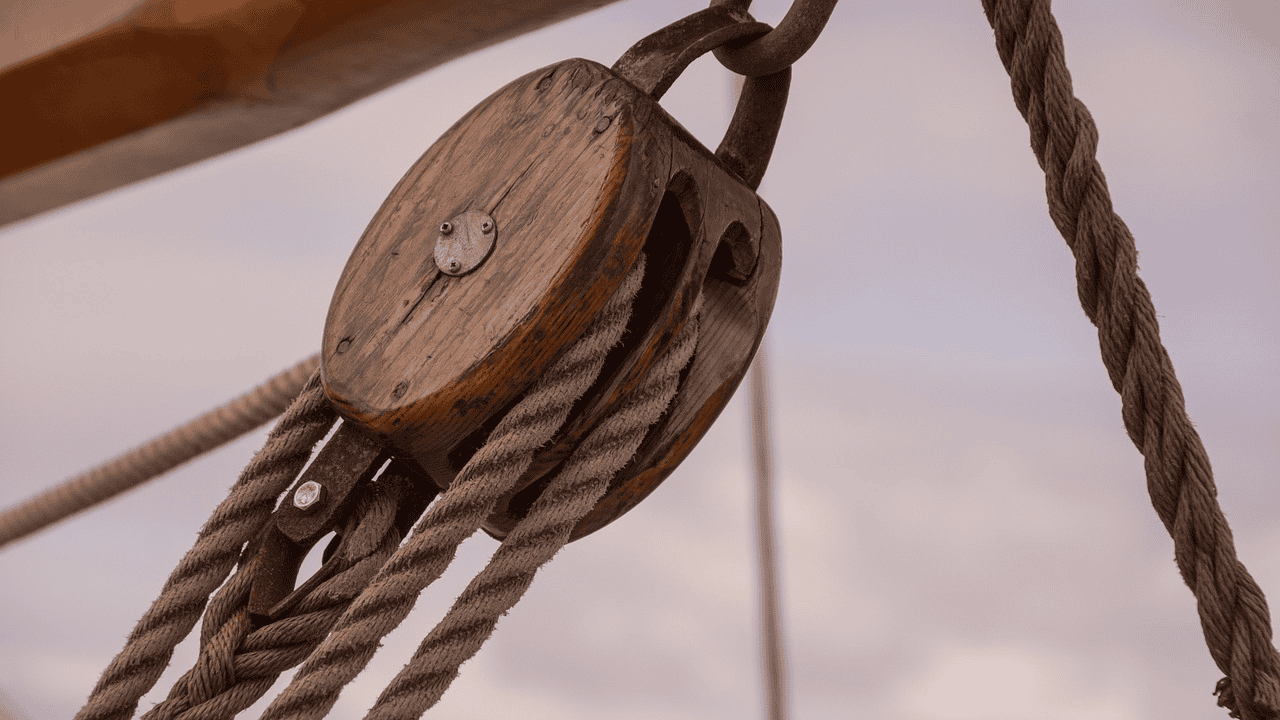
Source: Pixabay
Do you have heavy equipment or vehicles to tow? The nylon rope is the perfect material for this application because of its excellent shock absorbance and breaking strength.
Climbing rope

Source: Pixabay
Nylon rope is one of the most common ropes used for rock climbing or hiking. Get the best out of your outdoor adventures by using a strong and durable rope like nylon and you don’t have to worry about your safety. Its high stretch, impressive tensile strength, and flexibility is great for easy handling and carrying the weight of a person.
Obstacle courses

Source: Pixabay
Nylon is an excellent material to create obstacle courses like hanging obstacles, climbing nets, and rope ladders. Its very strong and durable, so you can use it creatively however you’d like for different kinds of obstacle courses.
Rescue operations
Nylon rope is also good for safety and rescue operations because of its great shock cord quality. It’s as secure as bungee cords, so you can use it for emergency purposes such as rescuing people.
Crafting
Hollow braid nylon ropes are easy to splice which comes in handy for crafting or decorative purposes. You can use it to make handicrafts like macramé, rope basket, and more.
How to Care For and Maintain Your Nylon Rope

Source: Pexels
Rope care and maintenance are very important if you want your rope to last long. Firstly, you want to do your regular inspections to ensure your rope is still in good quality. Failing to do a regular inspection can cause unwanted accidents while using the rope.
You must also clean it regularly to remove dirt, debris, or other contaminants. Rinse it with cold water first, then use a mild soap or detergent and scrub off any dirt using a brush. Make sure that no soap is left on the rope when you rinse it with water. Lastly, hang the rope to air dry it, but not directly under sunlight.
Storing your rope properly is also an important part of its maintenance. You don’t want to store it in a place of direct sunlight because prolonged exposure to UV can weaken or damage it.
You want to wind the rope in a circle or coil and secure the ends of the nylon rope properly, so they don’t fray or fall apart. Please keep it in a cool and dry place.
Where Can You Get a Nylon Rope Bulk or Wholesale?
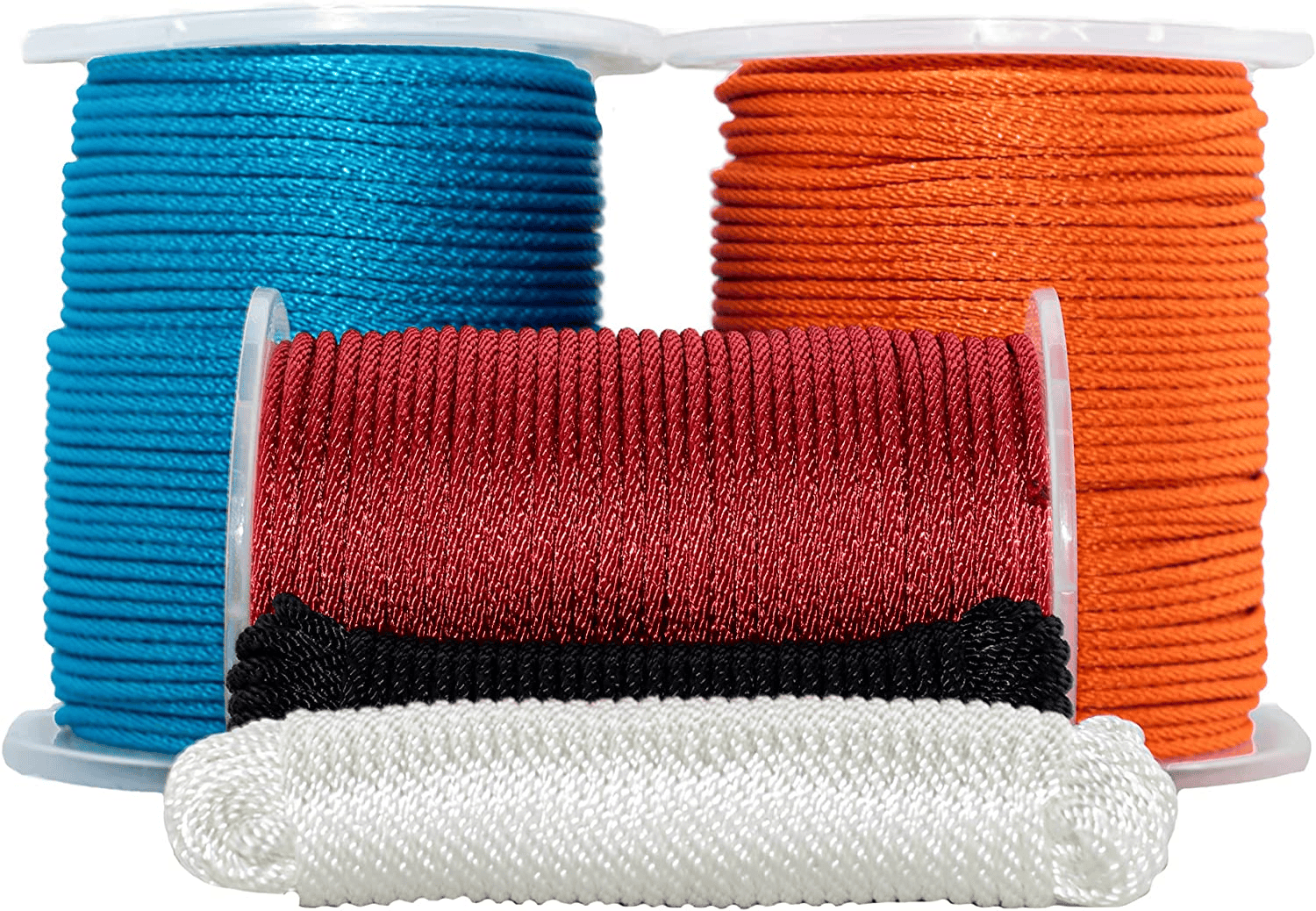
Source: Baiyuheng Outdoor
Now that you know all about nylon rope, the next part you need to worry about is finding a good nylon rope manufacturer. Don’t fret because that’s exactly what we’re here for.
Whether you’re a wholesale buyer or buying for a one-time project, we got you covered! You can get different rope supplies in our store, Baiyuheng Outdoor, at competitive prices that match the quality we put out.
Our Solid Braid Nylon Rope is your multipurpose rope for indoor and outdoor applications. This nylon rope features high tensile strength and durability, great for industrial, recreational, and decorative purposes. It’s available in different lengths, colors, and diameters, suitable for any roping needs.
Conclusion
Nylon rope is a versatile rope that boasts many outstanding features. It has great strength, durability, flexibility, and high stretch. Nylon’s resistance to abrasion, rot, mold and most chemicals makes nylon an excellent rope. That’s why it’s handy for most heavy applications like towing, anchoring lines, climbing, etc. All in all, nylon rope is a fantastic rope you can use for various purposes.

